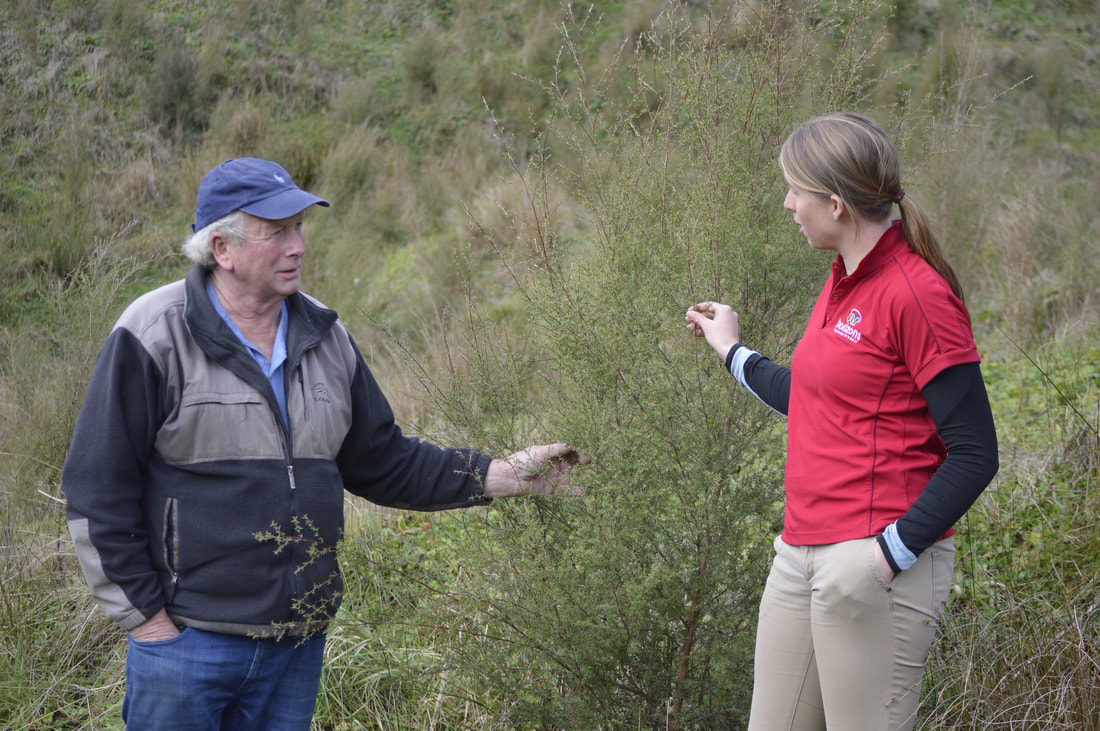|
Last year Mānuka Honey, often referred to as ‘liquid gold’, fetched up to $127 per kg in exports[1]. This sort of figure has got many jumping into the industry. Across the country land owners have either taken the plunge or are considering diversification to supplement their income, or to even create a new primary income. Mānuka honey is a premium product with highly sought after properties, and if done right, producing it can be very profitable.
|
With funding support from Horizons Regional Council and the Ministry for Primary Industries’ Afforestation Grant Scheme (AGS), Don is converting the steep hill-country farm over a period of six years. He planted 72 hectares as part of a trial in the first year, 350 hectares in the second year and will soon plant another 350 hectares this year.
“When we first purchased the property, I’m pretty sure our neighbours thought we were slightly mad,” says Don.
“It was a well performing sheep farm, and we decided to convert it.
“It just wasn’t the done thing. They are now very interested to see how we get on, to see whether this plan will be a success.”
Funding for the first year of planting was granted under Horizons’ Sustainable Land Use Initiative (SLUI). Don planted two different varieties of Mānuka; an early flowering variety with good growth rates sourced from the Coromandel and a later flowering variety sourced from the foothills of the Ruahine ranges near Eketāhuna. Mānuka on its own isn’t overly attractive to bees so the plants were also interspersed with flax in the lower reaches of the hills. Bees like flax pollen and their attraction to it will keep the brood (eggs, larvae and pupae) healthy.
In that first year Don and his team achieved an 85-90% survival rate for the plants. This was good going, however Don took it as a learning opportunity to find ways to achieve a higher survival rate.
“We realised the seedlings needed to be stronger so we fed that back to the nursery and now each seedling is 25-30cm in height, trimmed twice and 4mm in diameter,” says Don.
“We also spot sprayed around the Mānuka to keep the grass down and last year we were thrilled to achieve a 98% survival rate.”
When looking around the property the healthy plants are evident, covering the hillside in what will become a lush forest. Don has also planted his plants close together, at roughly 2.5-3m spacing so they will provide a canopy over the hillside once fully grown.
By planting the trees close together, Don also hopes to reduce sediment loss and erosion on the property. The full effects will not be seen for another seven years at least, however anecdotally the planted hills are already looking healthier.
“We have had a lot of rain this winter and you can already see some small slips on the unplanted slopes, whereas the planted slopes are clear of any slips,” says Don.
“If the land is stable, that is a huge benefit for us!”
“Scott has been so enthusiastic about this project. While he has never planted Mānuka before, he has a huge amount of experience in forestry,” says Don.
Two teams totaling 26 staff were contracted for the 2017 planting season, one of which will be back again this winter.
“Sourcing contractors can at times be tricky, it’s about finding reliable people for the job,” says Don.
“If we find the right people we will invite them back time and time again.”
Reliable seasonal staff are not the only challenges Tweeddale’s can face. Others include bee diseases such as American Foul Brood, tree diseases such as Myrtle Rust and fire.
Fortunately Myrtle Rust has not eventuated in the colder climates of Taihape which is a relief to Don and his team. Fire is a concern and the Tweeddale’s are planning water dams and fire breaks on their property to mitigate that.
Tweeddale’s supply their honey to Comvita and Mānuka Health, with the aim of producing medical grade honey of at least 15% (Unique Mānuka Factor) UMF. Essentially the higher the UMF percentage, the higher quality the honey will be and the higher rate of return achieved. Don was thrilled when he tested the native plants on his property to find they were at a 20% UMF level.
“We believe we are on to a good thing here as we have the right people in place and have established good systems,” says Don.
“Only time will tell, however this year will be the first year we will have bees on the property and that has to be exciting!”
If you are interested in planting Mānuka on your property the Mānuka and Kānuka plantation guide is an excellent resource. Horizons Regional Council have also gained extra funding for afforestation for this winter and are looking for expressions of interest for next winter. The aim is to link landowners into SLUI, AGS or other funding initiatives that may be available. For more information contact the Horizons land management team on 0508 800 800.
[1] Apiculture Ministry for Primary Industries 2017 Apiculture Monitoring Programme
[1] Apiculture Ministry for Primary Industries 2017 Apiculture Monitoring Programme


